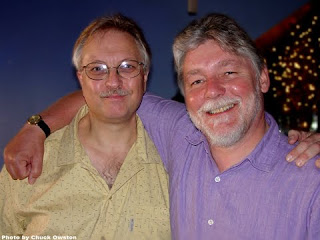Me and Chris Leslie in 2006
The original version of the song was recorded during the sessions that produced the Full House album and was released only as a single in September 1970. It did not appear on an album in the UK until the 1972 compilation, “History of Fairport Convention” was released. It was not released in the US until 1976 when it appeared on the USA only compilation, “Fairport Chronicles.”
Me and Simon Nicol in 2006; Simon played on the original recording
I became aware of Fairport when my brother gave me about 30 albums from his collection and a nifty 12-string electric Dan Electro Bellzouki following his move back to Pennsylvania in the fall of 1972.
The albums represented a wide variety of music that included everything from doo-wop to hard rock. The group of albums contained the debut album by Fairport Convention which became one of my favorites of the whole lot. Although not considered their best work, I still believe this first LP stacks up very well – although it is much different from the band’s later recordings.
Studio Version with Dave Swarbrick
During spring 1973, I was pursuing the selection of import albums at Heads Together in Pittsburgh’s Squirrel Hill and found and purchased “History of Fairport Convention.” This became my introduction to Fairport’s traditional side as well as their song “Now be Thankful.”
As an aside, Fairport attempted to get into the Guinness Book of World Records with “Now be Thankful’s” flip side – an instrumental titled, “Sir B. McKenzie's Daughter's Lament For The 77th Mounted Lancer's Retreat From The Straits Of Loch Knombe, In The Year Of Our Lord 1727, On The Occasion Of The Announcement Of Her Marriage To The Laird Of Kinleakie.” Hoping for the longest song title, Guinness did not recognize the title as being legitimate.
Me and Ric Sanders of Fairport Convention in 2006
There are a number of interpretations of the lyrics and their meaning and there appears to be a medieval Christian connection. Back in the early 90s, my brother Chuck and I performed it for a Thanksgiving service at our home congregation.
When the stone
is grown too cold to kneel
In crystal waters I'll be bound
Cold as stone, weary to the sounds upon the wheel
Now be thankful for good things below
Now be thankful to your maker
For the rose, the red rose blooms for all to know
When the fire is grown too fierce to breathe
In burning embers I'll be bound
Fierce as fire, weary to the sounds upon the wheel
Now be thankful for good things below
Now be thankful to your maker
For the rose, the red rose blooms for all to know





I suggest the second line in fire reads "In burning irons I'll be bound"
ReplyDeleteYep.
DeleteI don't have a link but I saw a video interview where Thompson said their intent was more or less rebellious. Where their parents generation used this phrase in good times and in bad to accept whatever life handed them, Thompson's intent was to show the downside, and that you don't have to accept bad things, you can change them. So it was more or less sarcastic.
ReplyDeleteI have always viewed this song as a depiction of the torture of heretics by a medieval court (those who intone the chorus). Am I wrong?
ReplyDeleteThere are many hints in the lyrics to indicate this. The burning embers could mean the burning at the stake for heretics,as the mention of the wheel, a rather nasty torture referred to as the breaking on the wheel. The red rose that blooms for all, simply blood. This is pure conjecture of course.
DeleteWhich would make the first verse about a witch trial by water, the second burning for heresy
ReplyDelete"The red rose blooms for all" refers to Christ.
ReplyDelete